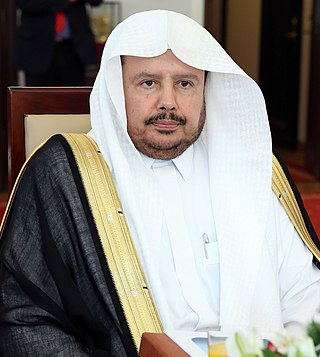| Grand Mufti of Saudi Arabia | |
|---|---|
| Office of the Grand Mufti of Saudi Arabia | |
| Style | Grand Mufti Sheikh |
| Status | Grand Mufti of Saudi Arabia |
| Member of | Permanent Committee for Islamic Research and Issuing Fatwas |
| Nominator | King of Saudi Arabia |
The Grand Mufti of Saudi Arabia is the most senior and most influential Muslim religious and legal authority in Saudi Arabia. The holder of the position is appointed by the King. The Grand Mufti is the head of the Permanent Committee for Islamic Research and Issuing Fatwas.
The Grand Mufti is the most senior religious authority in the country. His main role is to give opinions ( fatwas ) on legal matters and on social affairs. [1] The Saudi court system is heavily influenced by the opinions of the Grand Mufti. [2]
The office was created in 1953 by King Abdul Aziz with the appointment of Muhammad ibn Ibrahim Al ash-Sheikh. [3] Usually, the office of the Grand Mufti has been filled by a member of the Al ash-Sheikh (the descendants of Muhammad ibn Abd al-Wahhab). [4] In fact, there has only ever been one Grand Mufti of Saudi Arabia who was not an Al ash-Sheikh. [5] In 1969, King Faisal abolished the office of Grand Mufti and replaced it with a Ministry of Justice. The position was restored in 1993 with the appointment of Abdul Aziz bin Abdullah bin Baz. [6] The current mufti Abdul-Aziz ibn Abdullah Al Sheikh was appointed in 1999 by King Fahd after the death of Ibn Baz.
Abd al-Aziz, frequently also transliterated Abdul-Aziz, is a male Arabic Muslim given name and, in modern usage, surname. It is built from the words ʽAbd, the Arabic definite article and ʽAzīz "Almighty". The name is commonly abbreviated as "ʽAzīz". The name means "servant of the Almighty", al-ʽAzīz being one of the names of God in Islam, which give rise to the Muslim theophoric names.
Banū Tamīm is an Arab tribe that originated in Najd in the Arabian Peninsula. It is mainly present in Saudi Arabia, Qatar, Kuwait, Iraq, Jordan and Lebanon, a strong presence in Algeria, and Morocco, Palestine, Tunisia, and Libya. It is also present in many other parts of the Arab world such as Egypt and Khuzestan in Iran. The word Tamim in Arabic means strong and solid. It can also mean those who strive for perfection.
Abdul-Aziz ibn Abdullah ibn Baz, popularly known as Bin Baz or Ibn Baz, was a Saudi Arabian Islamic scholar who served as the Grand Mufti of Saudi Arabia from 1993 until his death in 1999 (1420AH). According to French political scientist Gilles Kepel, ibn Baz was a "figurehead" whose "immense religious erudition and his reputation for intransigence" gave him prestige among the population of Saudi Arabia. He "could reinforce the Saud family's policies through his influence with the masses of believers". His death left the government without a comparable figure from amongst Salafi scholars to "fill his shoes". He was a leading proponent of the Salafi school of thought.
Abdulaziz bin Abdullah Al-Sheikh is a Saudi Arabian scholar who is the current Grand Mufti of Saudi Arabia. As such he is head of the Council of Senior Religious Scholars and its sub-committee, the Permanent Committee for Islamic Research and Issuing Fatwas.
The Permanent Committee for Scholarly Research and Ifta is an Islamic organization in Saudi Arabia established by the King that issues rulings in Islamic jurisprudence (fiqh) and prepares research papers for the Council of Senior Scholars, which advises the king on religious matters. Its members are drawn from the Council of Senior Scholars, of which it is a committee, and consist of the most senior Sunni scholars of fiqh in Saudi Arabia, including the Grand Mufti of Saudi Arabia as its head. The issuance of fataawa in Saudi Arabia is limited to members of the Council of Senior Scholars and a few other clerics.
Abdelrahman or Abd al-Rahman or Abdul Rahman or Abdurrahman or Abdrrahman is a male Arabic Muslim given name, and in modern usage, surname. It is built from the Arabic words Abd, al- and Rahman. The name means "servant of the most gracious", ar-Rahman being one of the names of God in the Qur'an, which give rise to the Muslim theophoric names.
Rabīʿ bin Hādī ʿUmayr al Madkhalī is a Saudi professor who is a former head of the Sunnah Studies Department at the Islamic University of Madinah. He is a Salafi Muslim scholar who is considered to be one of Salafism's prominent thinkers. He was most active in the 90’s and early 2000s where he received praise from other Salafi scholars like Shaykh Salih Ibn Uthaymeen and Shaykh Abdul Aziz Bin Baz. Another prominent Salafi scholar named Imam Al-Albani labelled him the Imam of Jarh Wa Tad’il
Abdul-Rahman bin Nasir al-Barrak is a Saudi Salafi cleric.
The Al ash-Sheikh, also transliterated in a number of other ways, including Al ash-Shaykh, Al ash-Shaikh, Al al-Shaykh or Al-Shaykh is Saudi Arabia's leading religious family. They are the descendants of Muhammad ibn Abd al-Wahhab. In Saudi Arabia, the family is second in prestige only to the Saudi royal family, the Al Saud, with whom they formed a power-sharing arrangement nearly 300 years ago. The arrangement, which persists to this day, is based on the Al Saud maintaining the Al ash-Sheikh's authority in religious matters and the Al ash-Sheikh supporting the Al Saud's political authority.

Saleh bin Abdul-Aziz Al ash-Sheikh is a Saudi cleric who served as the minister of Islamic affairs, endowments, call and guidance of Saudi Arabia between 1996 and 2014, and again since 2015. He is a member of the Al ash-Sheikh, the influential Saudi religious family.

Abdullah ibn Muhammad Al ash-Sheikh is the chairman of the Majlis ash-Shura of Saudi Arabia since February 2009. He was the minister of Justice from February 1992 to February 2009.
Muḥammad ibn ʾIbrāhīm ibn ʿAbd al-Laṭīf ibn ʿAbd al-Raḥmān ibn Ḥasan ibn Muḥammad ibn Abd al-Wahhāb Al Shaykh Al-Tamīmī, was a Saudi Arabian religious scholar who served as the first Grand Mufti of Saudi Arabia from 1953 until his death in 1969. He is recognized as being amongst the forefront of Salafi theologians in history.
Ibrahim ibn Muhammad Al ash-Sheikh was a leading Salafi scholar in Saudi Arabia and minister of justice between 1975 and 1990.
ʿAbd Allāh ibn ʿAbd al-Laṭīf Āl ash-Shaykh (1848–1921) was a scholar from Nejd in Arabia and was the grandfather of King Faisal. He was a descendant of Muḥammad ibn ʿAbd al Wahhāb.

The judiciary of Saudi Arabia is a branch of the government of Saudi Arabia that interprets and applies the laws of Saudi Arabia. The legal system is based on the Islamic code of Sharia, with its judges and lawyers forming part of the country's religious leadership or ulama. There are also non-Sharia government tribunals which handle disputes relating to specific royal decrees. Final appeal from both Sharia courts and government tribunals is to the King of Saudi Arabia and all courts and tribunals follow Sharia rules of evidence and procedure.

Supreme Council of Magistracy of Saudi Arabia is a seven-eleven member council appointed by the King in the legal system of the Kingdom of Saudi Arabia. It supervises the lower courts of Saudi Arabia – overseeing judges' performances and new judicial appointments – but also provides "legal opinions, advises the King, and reviews sentences involving death, stoning, or amputation".. The Minister of Justice serves as the chief of the Council.

The Ministry of Justice is a government agency in Saudi Arabia that was established in 1970 by King Faisal of Saudi Arabia. The ministry oversees the court system of the Saudi Arabia and any associated prosecutorial services, and fulfill their financial and administrative requirements. Other responsibilities include appointing judges and providing licenses to attorneys, translators, and legal experts. By 2020 and in line with the Saudi Transformation Program, the Ministry of Justice is planning to digitalize 80% of its services.

Saad ibn Nasser al-Shathri is an Islamic scholar from Saudi Arabia. Since 2015, he has been a member of the country's Council of Senior Scholars and an advisor to the royal court of King Salman.
Abdullah bin Muhammad Al Sheikh (1751–1829) was a Muslim scholar who served as the head of the judicial system during the First Saudi State, also known as the Emirate of Diriyah. He was a son of Muhammad ibn Abd al-Wahhab, who was credited with introducing the Wahhabi sect of Islam. Abdullah developed the doctrine of this religious belief. David Commins, an American scholar on Wahhabism, argues that Abdullah was the most significant son of Muhammad.